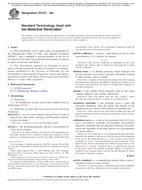1.1 As the contamination of freshwater and saltwater ecosystems continues to be reduced through the implementation of regulations governing both point and non-point source discharges, there is a growing emphasis and concern regarding historical inputs and their influence on water and sediment quality. Many locations in urban areas exhibit significant sediment contamination, which poses a continual and long-term threat to the functional condition of benthic communities and other species inhabiting these areas (1). Benthic communities are an important component of many ecosystems and alterations of these communities may affect water-column and nonaquatic species.
1.2 Biological tests with sediments are an efficient means for evaluating sediment contamination because they provide information complementary to chemical characterizations and ecological surveys (2). Acute sediment toxicity tests can be used as screening tools in the early phase of an assessment hierarchy that ultimately could include chemical measurements or bioaccumulation and chronic toxicity tests. Sediment tests have been applied in both saltwater and freshwater environments
1.3 This guide is arranged as follows:
| Section | |
| Referenced Documents | 2 |
| Terminology | 3 |
| Application | 4 |
| Summary of Guide | 5 |
| Significance and Use | 6 |
| Hazards | 7 |
| Sediment Test Types | 8 |
| Biological Responses | 9 |
| Test Organisms | 10 |
| Experimental Design Considerations | 11 |
| Data Interpretation | |
| Keywords |
1.4 The values stated in SI units are to be regarded as the standard. The values given in parentheses are for information only.
1.5 This standard does not purport to address all of the safety concerns, if any, associated with its use. It is the responsibility of the user of this standard to establish appropriate safety and health practices and determine the applicability of regulatory limitations prior to use. For specific hazard statements, see Section 7.
Product Details
- Published:
- 02/01/2002
- Number of Pages:
- 25
- File Size:
- 1 file , 230 KB
- Redline File Size:
- 2 files , 440 KB


